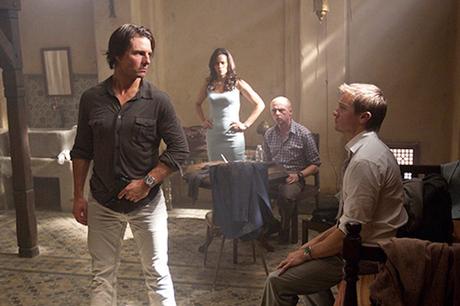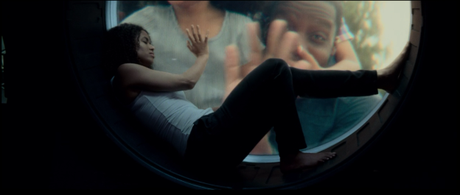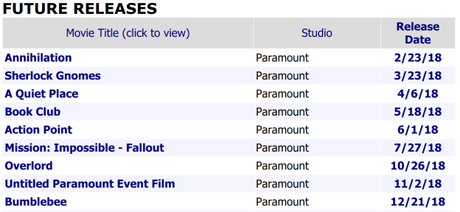Disney bought Fox, or at least announced it is going to once the terms are finalized and regulators give them the green light. And Hollywood went apeshit. Disney buying another studio? Sure. That's just what the Mouse House does. It lurches through every facet of the entertainment industry and absorbs the competition like the Blob. But Fox? Awww, man. Fox Searchlight, 20th Century Fox, and FX are each producing some of the best content in all of film and television right now. For lack of a more eloquent description, they kick ass. If they can be sold how in the world can anyone hope to compete with Disney?
Easy: become a giant conglomerate too. Either scale up and join forces with other studios through mergers or simply give up and get the heck out of Dodge.
So, right now the industry is just waiting for the other shoe to drop. Which studio is going to be next? Will Sony's new CEO cut Columbia Pictures loose and sell it to a rival studio or even maybe one of the big tech companies with more money than God, maybe one that rhymes with Mapple or Mamazon? Could LionsGate have another consolidation move up its sleeve after already purchasing Starz a little over a year ago? And what in the world will Viacom do with Paramount?
The answer to that last question appears to be this: nothing.
Viacom, which had once been heavily angling to sell a 50% stake of Paramount to Chinese partners, is standing pat for the moment even though the studio's financials are a truly sorry state of affairs right now. Year-over-year revenue is down 48% this fiscal quarter, and Paramount has not finished among the top five in market share since 2011, the year of Transformers: Dark of the Moon, Thor, Captain America, Super 8, Puss in Boots, Paranormal Activity 3, and Mission Impossible: Ghost Protocol. Oh, those were the days.

Except they weren't. Not really.
Look at that list again and you'll see Paramount's last great hurrah mostly came as the distributor for movies produced by independent studios (Marvel Studios' Thor and Captain America, DreamWorks Animation's Puss in Boots) which later moved on to more lucrative partnerships elsewhere. Moreover, Paramount was in on the ground floor of Jason Blum's micro-budget horror factory and somehow let him and Blumhouse walk over to Universal, content to merely maintain control of the Paranormal Activity franchise.
To their credit, Paramount's bosses did recognize what they had in J.J. Abrams and signed him to a multi-picture deal, but within three years of Super 8's release he was allowed to renege on the deal to direct The Force Awakens for Disney and now he's done it again for Episode 9.
Failures like that are enough to get a guy fired, and that's more or less what happened to longtime Paramount boss Brad Grey, who became just one of the many figurative casualties of Shari Redstone's Red Wedding-esque cleansing of Viacom before, tragically, becoming a literal casualty as well. He died from cancer-related complications shortly after being ousted from the studio. It was a shocking and depressing end for an executive who had been responsible for producing 8 of Paramount's 10 biggest hits of all time.

Grey's replacement, Jim Gianopulos, has made more headlines in his short tenure for what movies he's not releasing instead of the the ones he is. He sold The Cloverfield Paradox to Netflix for $50m, instantly recouping the film's reported $40m budget and scoring a PR win when his instincts were validated by the Paradox's negative reviews. Prior to doing that, he also sold international rights for Alex Garland's Annihilation to Netflix. Thus, Gianopulos is either a studio boss who's not particularly interested with releasing movies in theaters anymore or he's like the new manager of a sports team offloading bad deals, players, contracts, and just generally whatever he inherited but doesn't much care to deal with.
It's the latter, and a new report from MarketWatch provides some insight as to why.
Simply put, Gianopulos inherited a studio carrying a considerable deal of debt. The studio's Chief Financial Officer, Wade Davis, "said the studio has reduced gross debt by 23% since announcing its plans to right the ship a year ago. At the end of the quarter, Paramount still had $10.2 billion of outstanding debt and $394 million of cash on hand."
That's exactly why Paramount seemed to hit the jackpot with a $1 billion deal with Huahua Media to finance 25% of the studio's films in 2017 through 2019. At long last, financial relief. However, that deal crumbled later last year when the Chinese government clamped down on foreign investments.

As if all of that wasn't bad enough, Paramount is in the midst of a real fallow period, releasing failed awards contenders ( Allied, Downsizing, mother!, Suburbicon, Silence), failed franchise starters and re-starters ( Ghost in the Shell, Baywatch, Rings, Terminator: Genisys), failed faith-based offerings ( Ben-Hur), and failed...um....whatever the heck Monster Trucks was. In-house franchises like Star Trek, Teenage Mutant Ninja Turtles, Jack Reacher, and Paranormal Activity have stalled or flamed out. To be fair, the most recent Transformers movie still made over $600m worldwide, but that was a 45% decrease from the last film in the franchise.
Really, Paramount is a studio that has Mission Impossible and nothing else truly reliable right now. So, Gianopulos is instituting severe austerity cuts and paring the studio's 2018 release slate down to just 9 movies. At a glance, it almost looks like they're not even really trying anymore:

As such, in the age of consolidation, the question with Paramount would seem to be when not if. Paramount still presents value to any interested buyers due to its brand awareness and, more importantly, a massive back catalog of titles. But in a post-Disney/Fox world how can Paramount still be a thing that exists on its own?
It's not on its own, though. It's already part of a conglomerate. And ever since Shari Redstone assumed control of the family business after her 90-something father's ill health she has doubled down on everything that once made Viacom great and staked her reputation on being able to revitalize faltering brands like MTV, Comedy Central, Nickelodeon, and Paramount, to name a few. Hell, she (or, more accurately, the people she hired/promoted to execute her vision) slapped the Paramount name onto what used to be SpikeTV. Now, she's in the middle of yet another power play, attempting to re-merge Viacom with CBS and possibly push out Les Moonves in the process.
Sell Paramount? Why would she do that when she might just execute a hostile takeover of America's #1 TV network?
Moreover, Gianopulos hasn't even been there a year yet. That's not nearly long enough to fail or succeed. On a quarterly earnings call, Wade Davis stressed to stockholders when Gianopulos vision for the studio will produce dividends: "Turning to fiscal 2019, the slate will reflect the studio's new strategy and cost of business. Half of the 2019 slate will be co-branded films and six of the films have production budgets of $25 million or less."
Co-branded films? What's he talking about?
Well, Viacom is trying, just like everyone else, to be Disney. If Bob Iger can build his company around a bunch of distinct content silos - Marvel, LucasFilm, Pixar, and Disney Animation - why can't Viacom? So, at this time last year, Viacom's CEO announced the company's new strategy to build itself around six pillars: Nickelodeon, Nick Jr., MTV, BET, Comedy Central, and Paramount. "We will bring a set of our TV brands to film and our film brands to TV in a major way," said Bob Bakish.
Huh?

They're going to turn more of their TV shows into movies while also trying to turn more of their original movies into TV shows. That starts this year with Amusement Park, a Paramount movie due in the summer and set to then become a TV series next year. Several Nickelodeon franchises are being developed into films already, and anything from Comedy Central or any of the other pillars is fair game as well. And if Redstone pulls off her move to reintegrate with CBS that will probably become one of Viacom's new pillars feeding into Paramount.
So, while the rest of the industry whispers about consolidation and frets over the ever-escalating scale of things, Paramount is talking synergy and fiscal responsibility. Viacom wants to make a serious go at finally fully integrating its TV and film operations, and that can't happen if Paramount is unloaded out of some kind of kneejerk fear over a post-Disney/Fox world.
Whether or not any of this will work or is even a good idea in the first place is another matter. Recent history has not been kind to other studios and their corporate owners that try to mimic Disney's honed-to-perfection knack for synergy, although Paramount is going about this with an eye toward more sensible budgets (for example Bumblebee, the upcoming Transformers spin-off will cost $130m less to make than Last Knight). But all of this is why a wildly successful studio like Fox could be sold while a fledgling legacy studio like Paramount gets a stay of execution. The Murdochs wanted to scale down and sold most of their film and TV assets to Disney, but Shari Redstone wants to scale up and Paramount is a huge part of that

